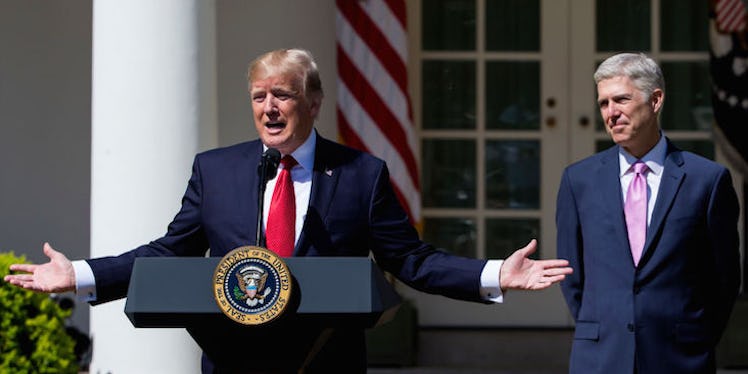
This Is Not The Way To Remove Donald Trump From The Presidency
Donald Trump is not having a very good June.
Robert Mueller, the special counsel leading the FBI's Russia probe, is now reportedly examining whether Trump committed obstruction of justice, according to the Washington Post.
And despite Deputy Attorney General Rod Rosenstein's recent statement on not believing "anonymous sources," the president himself acknowledged in a furious Twitter thread that he is being investigated:
Given that obstruction of justice is what many Democrats -- including California House Rep. Maxine Waters -- hope will open the door to impeachment proceedings, reporters and politicians alike are smelling blood in the water.But, impeachment is a formal process with a lot of steps. We've written about it before.
While the House vote requires a simple majority, two-thirds of the Senate must vote to impeach in order for a president to be removed from office.
So that brings up the question: if the legislative branch of government fails to impeach, can the judicial branch step in?
In other words, can the Supreme Court remove the President of the United States from office?
The simple answer? No.
Impeachment is a function of the legislative branch, and though the Chief Justice presides over Senate impeachment hearings, none of the justices have a say in the outcome.
That said, there is another way in which the Supreme Court could get involved in removing a president from office.
The Pence Route
Section 4 of the 25th Amendment to the US Constitution, which was ratified in 1967, states,
Whenever the Vice President and a majority of either the principal officers of the executive departments or of such other body as Congress may by law provide, transmit to the President pro tempore of the Senate and the Speaker of the House of Representatives their written declaration that the President is unable to discharge the powers and duties of his office, the Vice President shall immediately assume the powers and duties of the office as Acting President.
Now, on the surface, it seems like Pence and the rest of the Cabinet members would simply have to determine that Trump is "unfit" for office, thereby making Pence President Pro Tempore. (This is the exact plot of an episode of Scandal.)
That said, the Supreme Court could possibly rule on whether or not this rule was invoked appropriately, especially if the president refuses to step down. Otherwise, the Supreme Court has no say in the goings on of the executive branch.
So for now, it seems like the only hope lies with the legislative branch.